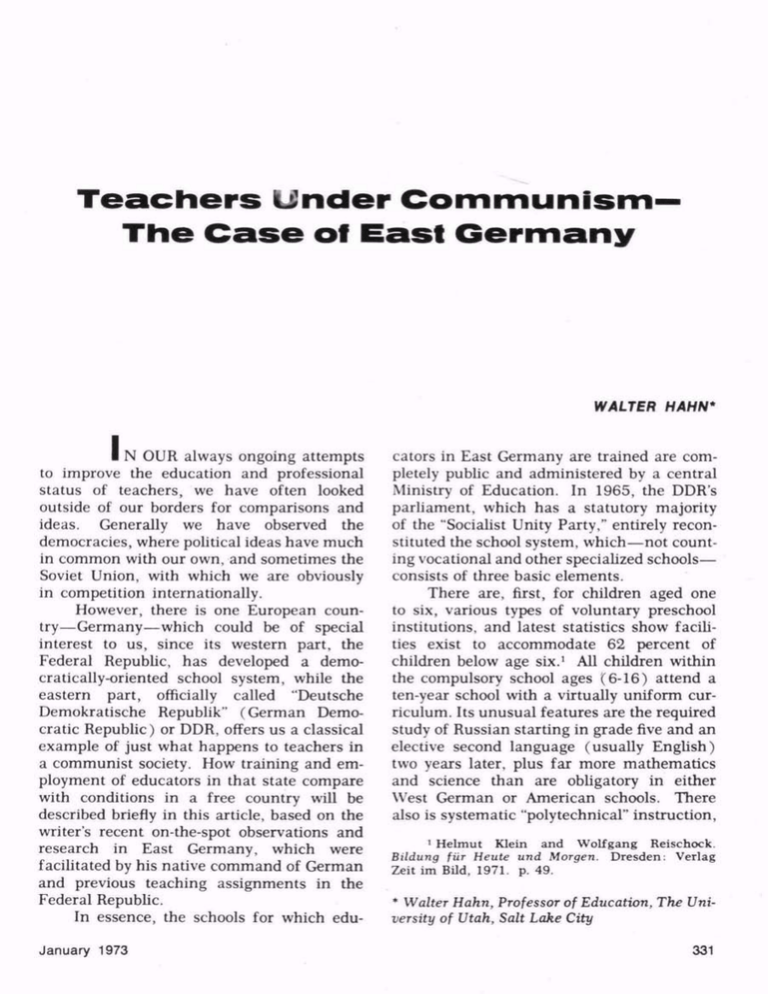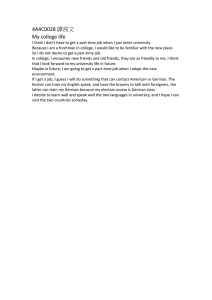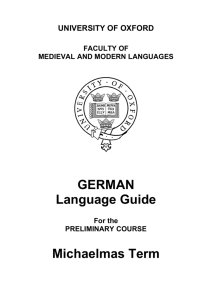
*achers Under Communism—
The Case off East Germany
WALTER HAHN*
I N OUR always ongoing attempts
to improve the education and professional
status of teachers, we have often looked
outside of our borders for comparisons and
ideas. Generally we have observed the
democracies, where political ideas have much
in common with our own, and sometimes the
Soviet Union, with which we are obviously
in competition internationally.
However, there is one European coun
try—Germany—which could be of special
interest to us, since its western part, the
Federal Republic, has developed a demo
cratically-oriented school system, while the
eastern part, officially called "Deutsche
Demokratische Republik" (German Demo
cratic Republic) or DDR, offers us a classical
example of just what happens to teachers in
a communist society. How training and em
ployment of educators in that state compare
with conditions in a free country will be
described briefly in this article, based on the
writer's recent on-the-spot observations and
research in East Germany, which were
facilitated by his native command of German
and previous teaching assignments in the
Federal Republic.
In essence, the schools for which edu
January 1973
cators in East Germany are trained are com
pletely public and administered by a central
Ministry of Education. In 1965, the DDR's
parliament, which has a statutory majority
of the "Socialist Unity Party," entirely recon
stituted the school system, which—not count
ing vocational and other specialized schools—
consists of three basic elements.
There are, first, for children aged one
to six, various types of voluntary preschool
institutions, and latest statistics show facili
ties exist to accommodate 62 percent of
children below age six. 1 All children within
the compulsory school ages (6-16) attend a
ten-year school with a virtually uniform cur
riculum. Its unusual features are the required
study of Russian starting in grade five and an
elective second language (usually English)
two years later, plus far more mathematics
and science than are obligatory in either
West German or American schools. There
also is systematic "polytechnical" instruction,
1 Helmut Klein and Wolfgang Reischock.
Bildung fur Heute und Morgen. Dresden: Verlag
Zeit im Bild, 1971. p. 49.
* Walter Hahn, Professor of Education, The Uni
versity of Utah, Salt Lake City
331
LJJ___
-V——-•*•--:••
East Berlin's "House of the Teacher" is a center for in-service education.
dealing with both the technical and economic
aspects of production and offering concurrent
work experience in industry.
The third major element of East Ger
man education is the two-year "Extended
Secondary School" attended by only a mi
nority of 16- to 18-year-olds, who have a
choice of curricula stressing, respectively, the
classics, modern languages, and mathemat
ics and sciences. In contrast with Western
practices, the selection of students must, to
quote a recent party report, take into account
"the social structure of the population," thus
favoring children of workers and peasants. 2
A Communist System of
Teacher Education
For work in preschool institutions, train
ing is given in two years on a vocationalschool level in "Pedagogical Schools," to
which students are admitted after completion
2 Heinz Kahra et al. "Forderung der Arbeiterund Bauern-Kinder unter den Bedingungen der
Gesellschaftlichen Systems des Sozialismus." Piidagogik 25. 1 020; 1970.
332
of the ten-year school. Even prospective
teachers in grades 1 through 4 are similarly
accepted at about age 16 into "Institutions
for Teacher Education," where the four-year
curriculum includes some disciplines like
those required in democratic countries: the
mother tongue, arithmetic, an elective major
field, and pedagogical subjects. In addition,
however, there also is great stress, from the
start, on political education and on practical
work with children in youth movements and
schools, plus 15 weeks of full-time student
teaching in the last year of training. There
also is a lengthy paper on a topic within a
research area assigned to the institution by
the "Academy of Pedagogical Sciences."
To teach in grades 5-12, students must
complete the full twelve-year education, then
pass the "Abitur" (school-leaving examina
tion) and apply to a university or "peda
gogical academy" offering the two subjects
they plan to teach later. "While a student
may not be accepted by the particular institu
tion to which he applies," an educators' tradeunion official told this writer, "no one is
turned down entirely." The four-year training
Educational Leadership
"Continuous preservice involvement in practical school work and
research activities seems to give East German teachers a relatively good
preparation."
covers the two academic subjects, their
methodologies, and educational history and
psychology.
One of the traits distinguishing this
teacher education from what is done in the
West is the fact that "polytechnics" is re
garded as a teaching subject. Also, prospec
tive teachers must take a three-year course in
"social science" (Marxism-Leninism), plus
sports and military training. Finally, their
progress is tightly controlled by membership
in "seminar groups" of about 25 members led
by a faculty member. Throughout their train
ing, these young people are involved in many
practical experiences, such as vacation-camp
duties, guided action research, a practicum
on a specific topic, videotaped teaching per
formances, and extended student teaching.
This program, plus participation in partysponsored youth organizations, takes more
of the students' time than do academic pro
grams in a democracy.
On the other hand, young East Ger
mans, unless their parents' income is above
a specified level, have stipends covering
maintenance and fees. As a result, it ap
pears that the percentage of children from
workers' families is higher in DDR universi
ties than in the Federal Republic,3 and the
common American practice, gaining ground
in West European countries also, of students
being employed for pay is not in evidence in
the DDR. On the other hand, correspondence
and evening study are very much a part of
East German teacher education, especially
for educators already working in "Kindergar
ten" or in the four lowest grades but wishing,
by such academic courses, gradually to qual
ify for positions in the upper grades. 4
In the field of in-service education, East
Germany, more actively than its western
3 Horst Siebert. B ildungsproxis in DeutschDiisseldorf: Bertelsmann, 1970. p. 77.
4 Wolfgang Richter. Die Lehrerbildung in der
DDR. Berlin: Volk und Wissen, 1967. pp. 129ff.
neighbor, is urging its educators to
strengthen their professional background—
and, in addition, their allegiance to the
regime. For their benefit, the state maintains
"Cabinets for In-Service Education," and the
teachers union has "Houses of the Teacher,"
both existing in many cities. In East Berlin,
both institutions are combined and boast one
of the most elaborate pedagogical libraries in
the country. Among means of thus providing
in-service training are vacation courses in
Marxism-Leninism, teaching methodologies,
and school administration. "Cabinets of the
Good Experiences" are maintained, where
published reports on successful methods ini
tiated in any school are made available to
educators elsewhere.
Observations by teachers in other class
rooms are strongly encouraged. 5 In fact,
while in Dresden, this writer learned of
schools where vacation schedules are set so
as to facilitate such visits. For each school
subject, the state publishes a course of study
indicating goals to be achieved. An advanced
French class, for example, must enable stu•' Deutsches Padagogisches Zentralinstitut.
Lehrplaniverk und Untfrrichtsgestaltung. Berlin:
Volk und Wissen. 1970. pp. 290-92
land
January 1973
Identical construction reduces costs of new Ten-Year
Schools.
333
dents to report to French-speaking foreign
guests "the important achievements of social
ism in the DDK." ° Guidelines supplementing
courses of study often prescribe even the
exact number of hours for each topic within
a given subject, such as history. 7
From the standpoint of the American
observer, the important question is simply
this: Does this communist-style teacher
education program produce a superior
teacher? The answer, to be meaningful,
should be based on specific criteria for each
grade level and subject. However, this being
said, some general conclusions can be drawn.
For teachers of the first four grades, the
brevity of their total schooling (14 years)
raises doubt as to how much future teachers
can reasonably learn in that time. The
enormously large portion devoted to political
indoctrination in all teacher education pro
grams raises further serious questions in this
regard. Conversely, the continuous preservice
involvement in practical school work and
research activities seems to give East Ger
man teachers a relatively good preparation,
and polytechnical training in his own back
ground probably strengthens the teacher's
ability, especially in mathematics and the
8 Ministerium fur Volksbildung der DDK.
Lehrplan fur das Fach Franzbsisch. Berlin: Volk
und Wissen, 1970. p. 7.
7 Bruno Center. Geschichte, 11. Klasse-Methodische Himveise. B erlin. Volk und Wissen, 1969.
A school garden serves as a laboratory for polytechnical
instruction of young pupils.
334
Polytechnic instruction is an important part of many
teachers' jobs.
sciences, to teach applications of material
learned to life outside the school.
Positions and Salaries
Once hired, East German teachers doing
satisfactory work not only enjoy the same job
security as their West German counterparts,
but strong attempts are made to retain
women teachers after marriage. Three
months before and after childbirth, they are
on paid leave and then, even though no
longer drawing a salary, can return to a
school job within a further period of nine
months. With regard to teacher load,
progress made is an achievement of which
East German educators seem to be particu
larly proud, as shown by a pupil-teacher ratio
of 1:19.7. The current figures of 24 hours
of teaching per week in grades 1-8, and 23
hours per week in grades 9-12,s cannot be
compared with similar figures for Western
countries, since teachers in the communist
state spend much out-of-school time in only
theoretically "voluntary" youth movement
and similar activities. In fact, a British ob
server notes that political pressures on teach
ers are even stronger in East Germany than
in some other communist countries. 9
» Klein and Reischock, op. cit., pp. 73-75.
9 Nigel Grant. Society, Schools, and Progress
in Eastern Europe. Oxford: Pergamon Press, 1969.
p. 231
Educational Leadership
Teachers' salaries in East Germany are
determined by a large variety of factors. The
most important of these are level of training;
length of service; grade being taught; and
administrative responsibilities, if any. While
some of these factors also are determinants
of salaries in Western countries, including
the United States, other elements of East
German salary policies are without a true
equivalent in the West. One is a 30 percent
income tax exemption for teachers. Another
is the celebration of June 12 as the "Day of
the Teacher," when numerous educators are
officially promoted in rank (from "Lehrer"
to "Oberlehrer," "Studienrat," etc.) or are
granted various medals or titles, generally
accompanied by added remuneration. One
can only speculate on the extent to which the
state thus encourages the most effective
teachers or those most loyal to the regime.
It is difficult to describe the actual salary
situation in East Germany. The basic
monthly salary of 700 East Marks for a
bachelor without teaching experience cor
responds to about $170. 10 Since rents are
unbelievably inexpensive, staple foods like
bread and potatoes cheap, and medical care
free, this low salary still gives teachers a
decent living, and East German authorities
picture teachers' salaries as being higher than
those of "average citizens of the Republic." n
On the other hand, there are housing short
ages, and some perfectly ordinary foods are
often unavailable.
One must remember that, even though
East Germany is economically strong com
pared to most other communist nations, its
territory has always been poorer in resources
than the area west of it, and that since
World War II the "German Democratic Re
public" has not enjoyed outside help, such as
West Germany had from the Marshall Plan.
In fact, the Soviet Union has often placed its
satellite at a disadvantage in trade negotia10 Based on West German government esti
mates of the purchasing power of the East German
Mark ( The Bulletin, B onn. Vol. 19, August 24,
1971) and on the exchange rate between West
Germany's DM and the dollar on June 30, 1971.
11 W. Rosenkranz e t al. Polytechnical Educa
tion for All. Dresden: Verlag Zeit im Bild, 1965.
p. 42.
January 1973
Teaching duties in East Germany include youth move
ment work.
tions. All of this explains why East German
teachers have a much lower living standard
than their West German colleagues—let
alone teachers in the United States.
End of Isolation?
If there are any indications of current
trends in communist German education,
they should be evident from two recent major
developments. One of them is the coming
to power of the new leader, Erich Honnecker,
whose pronouncements on education at the
1971 party congress indicate that he will
rigidly adhere to the present Soviet-style
school system. East German teachers will
thus continue to pay a high price for what
ever advantages they may have in profes
sional training and status.
There also have been the recent negotia
tions involving the Western allies, the Soviet
Union, and the two Germanys. The result
may be an increase in visits of West Germans
to the East, but the idea of East Germany
permitting its citizens to travel to noncommunist countries, except under very unusual
circumstances, or to receive Western publica
tions has never been discussed. Only if and
when that isolation is substantially relieved
will East German teachers be able to make
significant contributions to a peace, which is
just as vital to them as it is to us.
n
335
Copyright © 1973 by the Association for Supervision and Curriculum
Development. All rights reserved.



